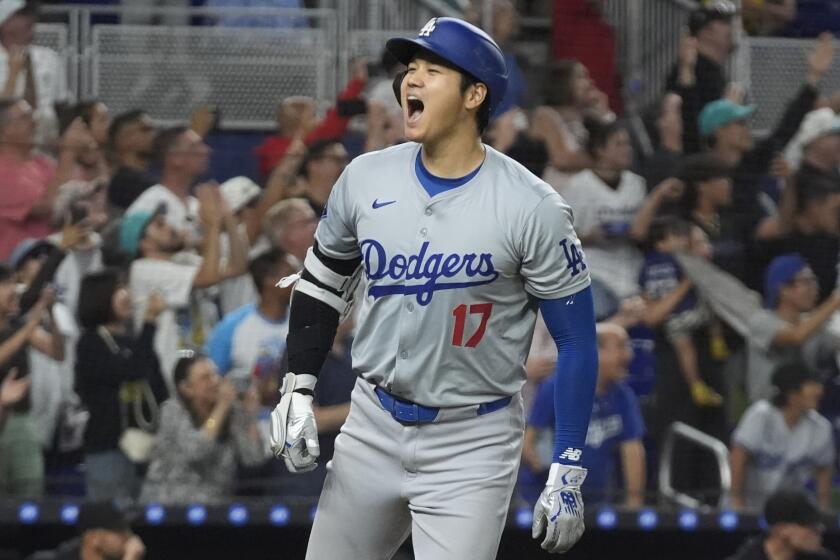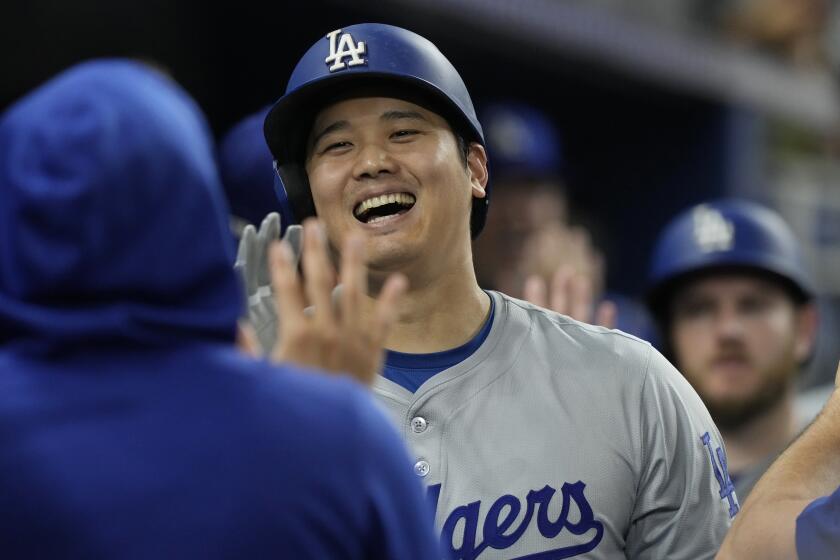A JOB WELL DONE
The image of polished perfection has made it to Springfield, Mass.
On one hand, that makes Pat Riley profoundly proud.
Because it’s as if his father is going to the Basketball Hall of Fame with him tonight.
“My dad was dashing,” he says of the late Lee Riley. “One thing he always did, was he had those wonderful Clark Gable-type suits on, and bright red ties and starched shirts. He had a lot of style to him.”
But on the other hand, the portrait of Pat Riley presented over 24 seasons as an NBA head coach also is a distortion.
“People think I’m aloof or I’m arrogant, and I have a sense of that,” Riley says of the refined persona that hardly tells the story of the kid from hardscrabble Schenectady, N.Y., who put in the type of hours these last three decades that belie the flawless facade.
“The fresh white shirt, tie, Armani suits, the image, the hair,” the Miami Heat president says, “that was the mantra, ‘Look fresh as a daisy,’ even though there were times after losses I felt like I wanted to die.”
The coach who was blessed with Magic Johnson, Kareem Abdul-Jabbar and James Worthy at the start, who arrived in New York with Patrick Ewing at the peak of performance, and who stepped back to the bench when Dwyane Wade and Shaquille O’Neal were poised to present Miami with its first NBA championship, mostly made it look easy since inheriting the Showtime Lakers 11 games into the 1981-82 season.
Tonight, that perfectly pressed package will be inducted into his sport’s ultimate cathedral.
“He kind of changed the game of coaching, with his smoothness, especially when he was younger, with all his Armani suits,” Wade says. “He made it cool to be a coach.”
The legacy is that he made it look easy.
The legacy lies.
“No one’s put in as much time as he has,” says Heat assistant coach Keith Askins, who played under Riley and served on his coaching staff. “He was prepared every day, every time he walked on that court. You can’t fool people with that. Either you put in the work, or you don’t.”
Some came to view the relentless approach as over the top.
One assistant quit when Riley would call from Europe to make sure his staff was at the gym, at sunrise, in the dead of summer. Another left Riley’s Heat staff after two seasons, overwhelmed by the commitment demanded.
The never-let-them-see-you-sweat coach privately sweated plenty, right until that day last April when he stepped down, convinced after 1,210 victories that it was time.
“I read a line one time,” he says, “and I believe it to this day: ‘Every day you’re not out there practicing, there is somebody else practicing twice as hard who is going to kick your butt.’ It’s the same thing with coaching.
“So a lot of that was based on fear, that somebody was going to be better than me, that somebody was going to beat me.”
More to the point, it was based on Schenectady, in the lessons of Lee Riley and Mary Riley.
Live to work. Work to live.
“My father had to grind it out, he simply had to grind it out for six kids,” Riley says. “My mother had to grind it out. So, we had the roof over our heads, we had food on the table, and we had hand-me-downs from one another.
“As soon as I was able to grind it out, they got me to grind it out too. Everybody became very independent in the Riley household, because we always knew how to work. We watched our parents work, every day. We’d get up at 6 a.m. . . . open up Lee Riley’s Variety store, or when he ran the General Electric Athletic Association, he would open it up, I’d go over and help him. All the kids had to go over sometime during the day and help him.”
Lawns were mowed in summer, driveways shoveled in winter, houses painted.
“He made us independent,” Riley says of his tough-love dad who saw his own major league baseball dream crushed after a mere four games with the Philadelphia Phillies in 1944. “And I really think, more than anything else, when I became a pro, there was a fear, a tremendous fear, that, ‘Now I’m out there. I’ve got to survive.’ ”
Along the way, the son became a husband, then a father. The look changed, but not the ethic.
“I never minded the work, because there was a job to be done,” he says.
“It was only five, six, seven years ago that I started to realize how much I really missed. And so, welcome to the world, because there are a lot of people that work very hard that miss a lot.”
He wishes his late parents weren’t missing this.
But being there in spirit long has been the Riley way, dating to those collegiate days under legendary Adolph Rupp.
“Even when I was at Kentucky, my parents very rarely ever came to games,” he says. “They couldn’t travel. They were working all the time. They just didn’t have the money to be able to go down there, fly down there all the time.
“So my dad used to take his car, his Dodge, and in the winter, he would drive up to the highest hill in Central Park and somehow he could get on the radio WHAS in Louisville and listen to Cawood Ledford. He’d take a six-pack with him and his Camels and whatever Mom made for a sandwich and he’d go up there.”
Patrick James Riley is 63 now. His father passed away 38 years ago, only three years into his son’s nine-year NBA playing career, well before that first game he ever coached. His mother died on the eve of the 2006 playoffs, the start of what would prove to be a run to her son’s fifth and final coaching championship.
In many ways, the duality continues, making this a day of celebration, and melancholy.
“It would be great,” he said, “if they both could be there.”
--
(BEGIN TEXT OF INFOBOX)
Hall of Fame
The Basketball Hall of Fame induction ceremony will be held tonight (4:30-6:30 PDT, ESPN Classic) in Springfield, Mass. Women’s basketball pioneer and Immaculata University coach Cathy Rush; Detroit Pistons, Shock owner William Davidson; and the following will be inducted:
ADRIAN DANTLEY
A 15-year NBA pro with seven teams, he was a six-time All-Star, won a gold medal with the 1976 Olympic team and was also rookie of the year in 1977. His 23,177 points rank 23rd all time in the NBA.
PATRICK EWING
A 17-year NBA player, 11-time All-Star, two-time Olympic gold medalist and three-time collegiate All-American. Totaled 24,815 points and 11,607 rebounds in his pro career, all but two seasons with New York.
HAKEEM OLAJUWON
Led Houston to consecutive NBA championships in 1994 and 1995, was named NBA most valuable player in 1994 and was a two-time defensive player of the year. Holds NBA record for blocked shots (3,830) and is the only player to record more than 3,000 blocked shots and 2,000 steals in a career.
PAT RILEY
Three-time NBA coach of the year. Ranks third on the all-time wins list in NBA history behind Lenny Wilkens and Don Nelson. Has five titles as a coach, four with the Lakers and one with Miami, and is one of the NBA’s 10 Best Coaches of All Time.
DICK VITALE
Former high school, college and professional basketball coach, was elected to the Hall of Fame as a contributor for successful run as a color commentator on the college game.
--
Source: NBA.com
More to Read
Go beyond the scoreboard
Get the latest on L.A.'s teams in the daily Sports Report newsletter.
You may occasionally receive promotional content from the Los Angeles Times.










